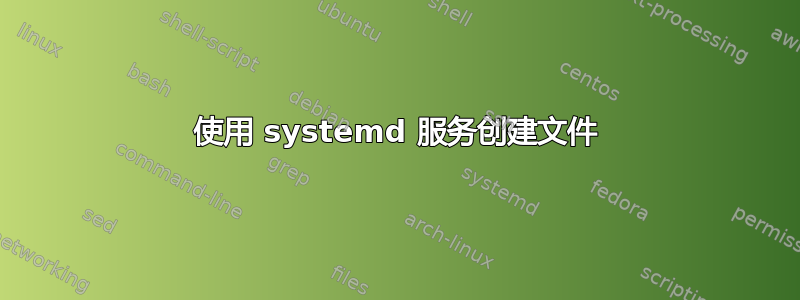
我正在尝试创建一个 systemd 服务来自动清除目录中的旧文件。如果我要手动执行此操作,我将使用如下命令
$ /usr/bin/touch -t $(/usr/bin/date -d'-7day' +%Y%m%d%H%M) /tmp/cutoff
$ /usr/bin/find /path/to/dir ! -newer /tmp/cutoff -exec rm {} \;
前一行确实会在/tmp目录中生成占位文件。但是,以下服务定义
[Unit]
Description=Cleanup index cache left behind by bup backup
Type=oneshot
[Service]
ExecStart=/usr/bin/touch -t $(/usr/bin/date -d'-7day' +%%Y%%m%%d%%H%%M) /tmp/cutoff
SyslogIdentifier=%p
无法生成占位符
$ /usr/bin/touch -t $(/usr/bin/date -d'-7day' +%Y%m%d%H%M) /tmp/cutoff
$ ls -l /tmp/cutoff
-rw-r--r--. 1 user group 0 Mar 20 14:36 /tmp/cutoff
$ rm /tmp/cutoff
$ sudo systemctl start cleanup_index_cache
$ ls -l /tmp/cutoff
ls: cannot access '/tmp/cutoff': No such file or directory
$
$ sudo systemctl start cleanup.service
$ ls -l /tmp/cutoff
是否有办法使用 systemd 删除超过一定时间的文件/目录?将 shell 命令转录为 systemd 指令是否缺少了什么?
答案1
systemd 不会ExecStart=通过 shell 发送命令及其相关命令。它会直接执行这些命令。因此您不能使用诸如这样的 shell 结构$()。
目前还不清楚你为什么要生成一个日期并用它来处理文件。find完全有能力自己找到超过一定时间的文件。
从手册页中:
-mtime n
File's data was last modified n*24 hours ago. See the comments
for -atime to understand how rounding affects the interpretation
of file modification times.
那段解释道:
-atime n
File was last accessed n*24 hours ago. When find figures out
how many 24-hour periods ago the file was last accessed, any
fractional part is ignored, so to match -atime +1, a file has to
have been accessed at least two days ago.
find还能够自行删除文件,而不需要调用rm(出于各种原因,这样做可能不是一个好主意)。
-delete
Delete files; true if removal succeeded. If the removal failed,
an error message is issued. If -delete fails, find's exit sta‐
tus will be nonzero (when it eventually exits). Use of -delete
automatically turns on the `-depth' option.
Warnings: Don't forget that the find command line is evaluated
as an expression, so putting -delete first will make find try to
delete everything below the starting points you specified. When
testing a find command line that you later intend to use with
-delete, you should explicitly specify -depth in order to avoid
later surprises. Because -delete implies -depth, you cannot
usefully use -prune and -delete together.
因此,要删除超过 7 天的文件,您可以直接运行find,无需执行其他任何有趣的操作:
/usr/bin/find /directory -mtime +6 -delete
答案2
systemd-tmpfiles是 systemd 的一项功能,可以配置为自动从目录中清除旧文件。无需每次需要清理目录时都启动新服务,只需创建一个包含/etc/tmpfiles.d/以下内容的文件:
# /etc/tmpfiles.d/cleanup_index_cache.conf
d /path/to/dir - - - 7d


